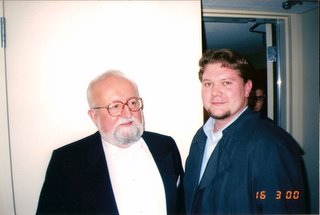Recently the Warrior-Bard (also known as my dear friend Tim) posted about his thesis composition, a work far from finished, but completed in draft form. First, good on him for getting it done because it's a pretty big accomplishment. In describing the genesis of his thesis he had the following to say:
"Film music can--and does--stand alone, apart from the events of a film (especially when it appears on the album in a concert form instead of chopped into three scenes throughout the film, as is the case with Toccata and Dreamscapes
). But this is another discourse entirely, one I don't have time for at the moment. I can let Brad field that one..."First of all, thanks to the almighty Warrior-Bard (and his anger, which has made him powerful)for giving me today's topic. We'll explore three common fallacies of film music.
1. Film music isn't supposed to draw attention to itself.
2. Film music that is "emotionally manipulative" is bad film music.
3. Film music isn't intended to exist outside of the film/music diegesis.
1. Film music isn't supposed to draw attention to itself.
"Experts" seem to think this is true. The "best" film music shouldn't draw any attention to itself ever. I think that this is slightly misplaced. I think what these "experts" want to say is "film music should be subtle enough that it doesn't force me to feel a specific emotion". While we'll tackle this shortly I want to address the first issue. The "best" film music is that which the composer and/or director has chosen the appropriate time to allow the music to play in the background or come to the foreground and help tell the story on another level. If the "best" film music isn't supposed to draw attention to itself, why is the music from
Star Wars a perennial favorite? Because it's good music. That's why.
2. Film music that is "emotionally manipulative" is bad film music.I had an interesting discussion with a young filmmaker when I was in Los Angeles last June (that's another posting) about "emotionally manipulative" music in film. His argument was that he felt that he disliked a lot of film music because of this. So we engaged in an interesting debate/discussion. This conversation took place shortly after he had seen both of the films that evening (both of which I scored) and was surprised that 1) I had written "actual music" and 2) it didn't shove his emotions around. I think I was eventually able to convince him that some people that think that "emotionally manipulative" music is being considered in the incorrect context. My point to him was that just because a cue is emotionally involved doesn't mean that it's trying the manipulate the emotional response of
you, the listener/viewer. Perhaps the composer was trying to express the emotional response of
the character or, heaven forbid, the overall situation. Or maybe he/she is actually portraying their
own musical/emotional response to the scene they're scoring. Ultimately, though it is the character and not
you, the audience, that is the important thing (in good film, anyway).
3. Film music isn't intended to exist outside of the film/music diegesis.Perhaps this was the original intention of film music; that it should/could/would never live outside of film, that it was the ultimate
gebrauchtsmusik. Can you extract an entire score for a concert performance? Perhaps. Should you? Not really. Not unless it's a colossal work such as
Lord of the Rings or
Star Wars where there is an abundance of music to choose from. (Anymore, though, I'd be more interested in hearing film music outside the construct of the film in which the composer has gone back and reworked the material into something that is more concert-like, just to prove his/her composition skills. Think about it, Korngold's
Violin Concerto is based on themes from his film scores that were recast in more traditional symphonic form.).
For me this is perhaps the most important of the three because I don't have to see the movie first in order to appreciate how great the music can be all on its own. Actually I would say that between 10-15% of my film score recordings are from films that I've never seen. But I like the music. Does seeing the movie make the listening experience more valuable? Of course it does. But sometimes you have a real stinker of a movie with a really tremendous score (did I hear someone say
Cutthroat Island?) and you like listening to it for whatever reason. Ultimately it means that it resonates with you and that is a deeply personal thing.
As is all art.
 Die Frau and I spent Sunday watching the entire Lord of the Rings trilogy. We like to do this every once in a while, just to have something to do for an entire day.
Die Frau and I spent Sunday watching the entire Lord of the Rings trilogy. We like to do this every once in a while, just to have something to do for an entire day.
